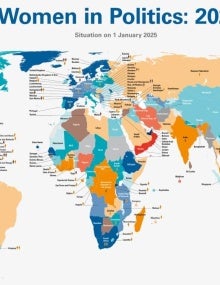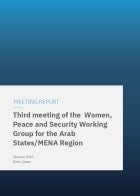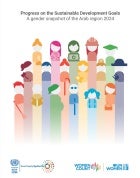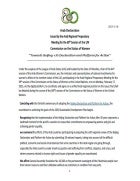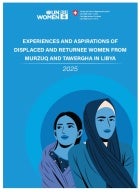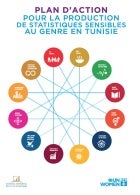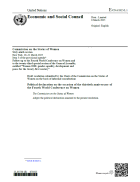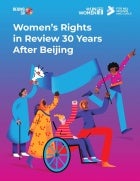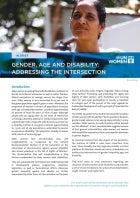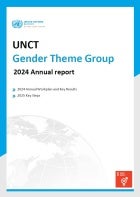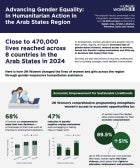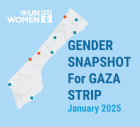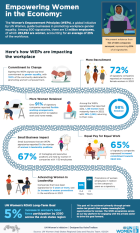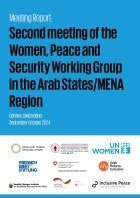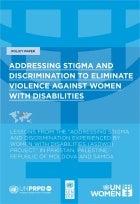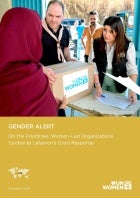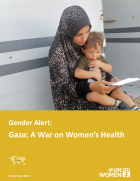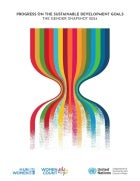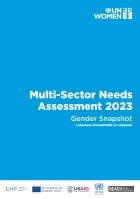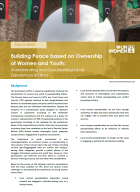Date:
This report provides a summary of the key findings of the third meeting of the WPS Working Group for the Arab States/MENA Region. The views expressed in this publication emanate from the meeting discussions and do not necessarily represent the views of the convening organizations, including the United Nations Entity for Gender Equality and the Empowerment of Women (UN Women), the United Nations or any of its affiliated organizations.
Date:
This report underscores the pivotal role of gender equality in driving SDG achievements and highlights the centrality of women and girls in shaping sustainable futures. It also addresses the interconnections between the SDGs, providing regional and subregional evidence of both progress and persistent inequalities.
Date:
Arab Declaration, Issued by the Arab Regional Preparatory Meeting for the 69th Session of the UN Commission on the Status of Women
Date:
This report examines the experiences of displaced and returnee women from Murzuq and Tawergha, focusing on their paths to durable solutions after years of displacement. Employing a mixed-methods approach, it reveals that many women have faced multiple displacements due to ongoing conflict, with limited access to services in displacement and upon return. While a significant portion desires to return home, infrastructure challenges and family pressures complicate their decisions. The report underscores the urgent need for targeted support and strategies to address the unique challenges faced by these women, fostering stability and empowerment in their communities.
Date:
Plan d’Action pour la production des statistiques sensibles au genre en Tunisie
Date:
The “Women in politics: 2025” map, created by the Inter-Parliamentary Union (IPU) and UN Women, presents new data for women in executive positions and national parliaments as of 1 January 2025.
Date:
Draft resolution submitted by the Chair of the Commission on the Status of Women on the basis of informal consultations
Date:
In 2025, the world celebrates 30 years of achievement on the Beijing Declaration and Platform for Action, a visionary 1995 plan agreed by 189 governments to achieve the equal rights of all women and girls.
Date:
Older women face discrimination, bias, and marginalization, as recognized by the General Recommendation Number 27 of the Convention on the Elimination of Discrimination Against Women.
Date:
In line with the United Nation Sustainable Development Group (UNSDG) Standards and Procedures, the Bahrain GTG was established to facilitate inter- agency, gender-responsive, programmatic, technical and policy advice to the UNCT at all stages of the United Nation Sustainable Development Cooperation Framework (UNSDCF) cycle.
Date:
Women and girls in emergencies face heightened risks, such as violence, limited access to services, and lack of decision-making power. Despite these challenges, they are crucial to recovery and building resilient communities.
Date:
These shocking statistics underscore the magnitude of suffering and the urgent need for global support to protect and empower women in Gaza.
Date:
The Women’s Empowerment Principles (WEPs), launched by UN Women, serve as a global framework for businesses to promote workplace gender equality.
Date:
This report provides a summary of the key findings of the second meeting of the WPS Working Group in the Arab States/MENA Region.
Date:
This publication provides recommendations for policymakers to address the findings highlighted through the project “Addressing stigma and discrimination experienced by women with disabilities (ASDWD)”...
Date:
Driven by the intensifying conflict, the recent escalating humanitarian crisis in Lebanon, has taken a profound toll on people’s lives. On the frontlines of the crisis response, women-led organizations (WLOs) are delivering critical, life-saving humanitarian assistance to affected populations, including women and girls in need.
Date:
The UN Women report Gaza: A War on Women’s Health reveals the devastating impact of Gaza's ongoing conflict on women’s health. With health facilities destroyed and thousands of women unable to access critical care, the report highlights urgent needs in maternal health, cancer treatment, and mental health support. It calls for immediate action to protect health workers, restore medical services, and prioritize the health of women and girls during the crisis.
Date:
This publication is the latest edition in an annual series produced by UN Women and the United Nations Department of Economic and Social Affairs. Covering all 17 Sustainable Development Goals (SDGs), the report highlights new data and evidence on gender equality trends and gaps. It finds that the world is still falling short on its commitments to women and girls.
Date:
This gender snapshot is based on the Multi-Sector Needs Assessment 2023, in which findings obtained from data collected with 3,642 households in Lebanon in 2023...
Date:
Policy Brief - Building Peace based on Ownership of Women and Youth:Understanding and Documenting Local Experiences in Libya.
